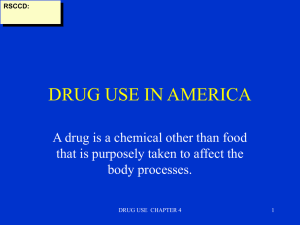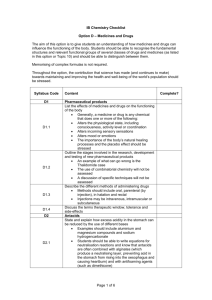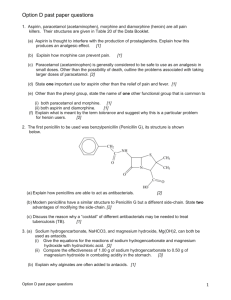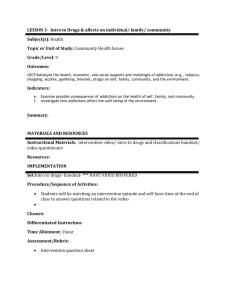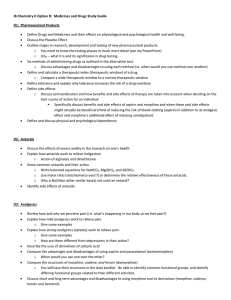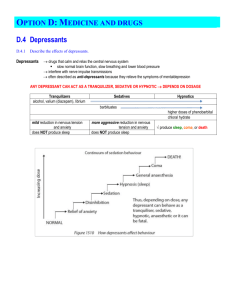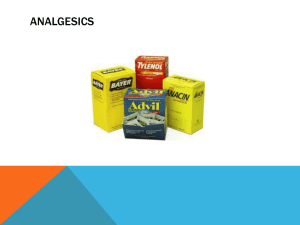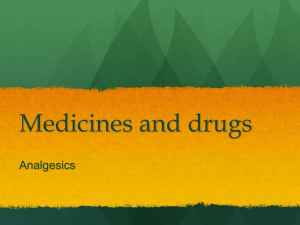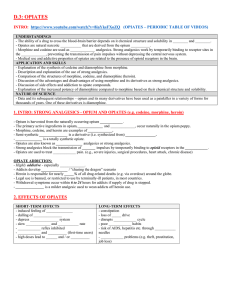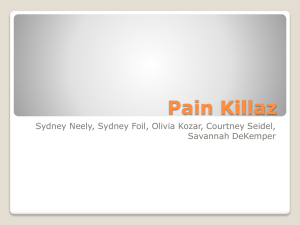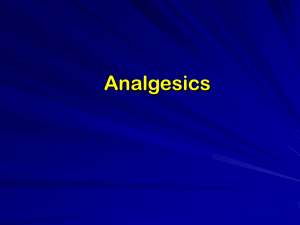Environmental Chemistry Group Presentation
advertisement
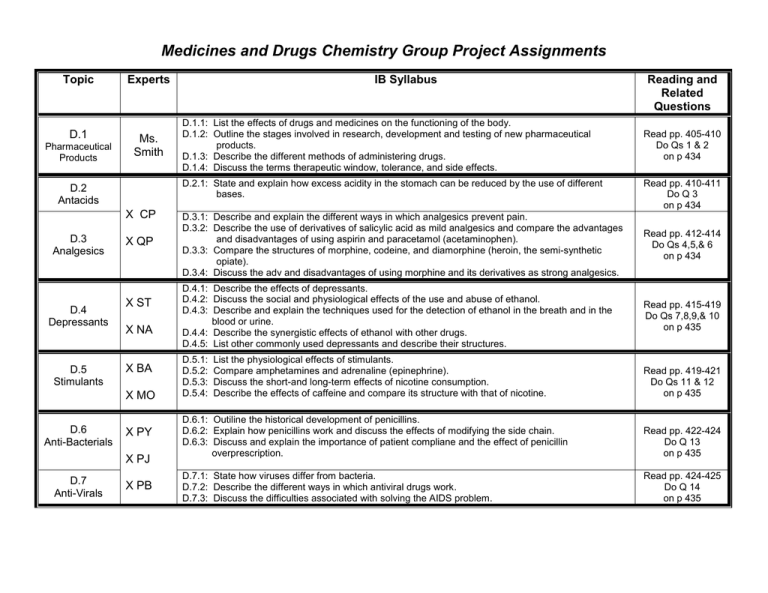
Medicines and Drugs Chemistry Group Project Assignments Topic D.1 Pharmaceutical Products Experts Ms. Smith X CP D.4 Depressants D.5 Stimulants X QP X ST X NA X BA X MO D.6 Anti-Bacterials X PY X PJ D.7 Anti-Virals D.1.1: List the effects of drugs and medicines on the functioning of the body. D.1.2: Outline the stages involved in research, development and testing of new pharmaceutical products. D.1.3: Describe the different methods of administering drugs. D.1.4: Discuss the terms therapeutic window, tolerance, and side effects. D.2.1: State and explain how excess acidity in the stomach can be reduced by the use of different bases. D.2 Antacids D.3 Analgesics IB Syllabus X PB Reading and Related Questions Read pp. 405-410 Do Qs 1 & 2 on p 434 Read pp. 410-411 Do Q 3 on p 434 D.3.1: Describe and explain the different ways in which analgesics prevent pain. D.3.2: Describe the use of derivatives of salicylic acid as mild analgesics and compare the advantages and disadvantages of using aspirin and paracetamol (acetaminophen). D.3.3: Compare the structures of morphine, codeine, and diamorphine (heroin, the semi-synthetic opiate). D.3.4: Discuss the adv and disadvantages of using morphine and its derivatives as strong analgesics. Read pp. 412-414 Do Qs 4,5,& 6 on p 434 D.4.1: Describe the effects of depressants. D.4.2: Discuss the social and physiological effects of the use and abuse of ethanol. D.4.3: Describe and explain the techniques used for the detection of ethanol in the breath and in the blood or urine. D.4.4: Describe the synergistic effects of ethanol with other drugs. D.4.5: List other commonly used depressants and describe their structures. Read pp. 415-419 Do Qs 7,8,9,& 10 on p 435 D.5.1: D.5.2: D.5.3: D.5.4: List the physiological effects of stimulants. Compare amphetamines and adrenaline (epinephrine). Discuss the short-and long-term effects of nicotine consumption. Describe the effects of caffeine and compare its structure with that of nicotine. Read pp. 419-421 Do Qs 11 & 12 on p 435 D.6.1: Outiline the historical development of penicillins. D.6.2: Explain how penicillins work and discuss the effects of modifying the side chain. D.6.3: Discuss and explain the importance of patient compliane and the effect of penicillin overprescription. Read pp. 422-424 Do Q 13 on p 435 D.7.1: State how viruses differ from bacteria. D.7.2: Describe the different ways in which antiviral drugs work. D.7.3: Discuss the difficulties associated with solving the AIDS problem. Read pp. 424-425 Do Q 14 on p 435 D.8 Drug Action D.9 Drug Design D.10 Mind-Altering Drugs X JaM X JaM X JS X RM X JH X ZP D.8.1: D.8.2: D.8.3: D.8.4: Describe the importance of geometrical isomerism in drug action Discuss the importance of chirality in drug action. Explain the importance of beta-lactam ring action of penicillin. Explain the increased potency of diamorphine (heroin) compared to morphine. D.9.1: Discuss the use of a compound library in drug design D.9.2: Explain the use of combinatorial and parallel chemistry to synthesize new drugs. D.9.3: Describe how computers are used in drug design D.9.4: Discuss how the polarity of a molecule can be modified to increase its aqueous solubility and how this facilitates its distribution around the body. D.9.5 Describe the use of chiral auxillaries to form the desired enantiomer. D.10.1: Describe the effects of lysergic acid diethylamide (LSD), mescaline, psilocybin and tetrahydrocannabinol (THC). D.10.2: Discuss the structural similarities and differences between LSD, mescaline and psilocybin. D.10.3: Discuss the arguments for and against the legalization of cannabis. Approximate Dates of Presentations: Monday, March 29 Tuesday, March 30 Thursday, April 1 Friday, April 2 Monday, April 5 Tuesday, April 6 Thursday, April 8 Friday, April 9 Monday, April 12 Tuesday, April 13 Thursday, April 14 Friday, April 15 Project Overview Work day…. Kinetics Kinetics Test (w/partner) D1 D2 Lab: Making Aspirin D4 D6 D8 D10 TEST – Medicine & Drugs D3 D5 D7 D9 Read pp. 425-427 Do Qs 15,16,&17 on p 436 Read pp. 427-431 Do Qs 18,19,&20 on p 436 Read pp. 431-434 Do Qs 21 & 22 on p 436
